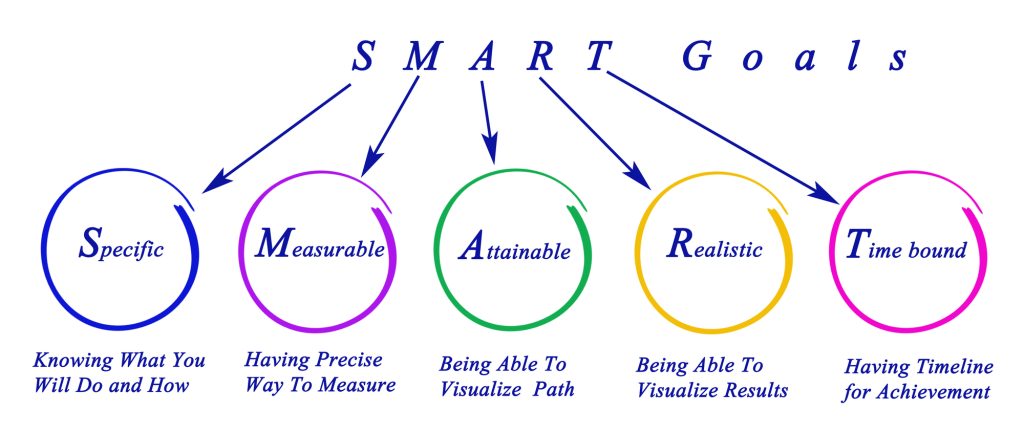
The new year is here, so that means students from all over and watching their calendars waiting for the end of the school year. Online students who have more flexible schedules are no different than anyone else, and they’re ready for their school year to wind down, too. The trouble arises when you realizes that even though you’re partway done with your school year, you’ve still got more ahead of you! How can you keep your motivation up and your trajectory aimed at your academic or your personal goals as you work your way through 2023?
SMART goals are a great tool for anyone, anywhere, to use to stay focused on achieving whatever task they have in front of them. For students, SMART goals are a great way to keep the momentum going as you round out your school year. Each letter in the acronym SMART stands for the criteria you follow when setting SMART goals.
S = Specific
M = Measurable
A = Achievable
R = Relevant
T = Time-Bound
Types of Goals
If you want to set SMART goals for 2023, you’ll want to start by figuring out what kind of goal you want to set for yourself. Do you want to improve something in your life, make something you’ve been wanting to make, or develop some positive attributes? Do you want to reduce something, like your carbon footprint or the number of times you have to be reminded to take care of your responsibilities? Maybe you want to increase something like your savings account or your GPA. Once you’ve determined a goal that you want to achieve, it’s time to focus in on making it happen.
Specific
Any goal you set needs to be specific; otherwise you might be aiming at too much or you might not be able to tell when or if you’ve accomplished the goal. Ask yourself some important questions about your goal in order to make sure its specific.
- • What am I going to accomplish?
- • What steps do I need to take to accomplish the goal?
- • When do I want to start working on this? Is there anything I need to do before I can start working toward my goal?
- • Do I have any obstacles standing in my way of achieving this goal?
- • Why do I want to achieve my goal? How will this benefit me? What is my motivation?
Once you have answered those questions, you should have a pretty good mission statement for your goal: an idea of exactly what you are going to accomplish, why you want to accomplish it, and how you’re going to make it happen.
Measurable
You’ve got to know when you’ve reached your goal, so making sure you have established how you’ll measure success is important, too. Your goal needs to be tangible so that you can tell if you’re done working toward it. How will you know when you’ve met your goal? You can set up separate, small, short-term milestones along the way in addition to the final major milestone to solidify your accomplishments.
This is an important part of planning. Do you need to save money before you can start? Do you need special training? Do you need feedback from other people? All of these questions will help you answer how you’ll make sure your goal is measurable so that you know when you’ve accomplished it.
Achievable
An awful lot of people want to be professional athletes, but if you’ve never participated in a sport in your life, aren’t particularly passionate about working out, and don’t like working as a part of a team, then that goal would not be achievable. In other words, your goal needs to be something that you can actually do, realistically.
This part of goal setting can be hard for some people. There’s nothing wrong with dreaming, but a dream can’t become a goal unless it is realistic and can be accomplished. If your goals can’t be accomplished, then they’ll always be dreams – in your head, but not in your life.
Think about these aspects of your goal to determine if its achievable:
- • How are you going to accomplish the goal? Can you write down realistic steps that you can actually do to achieve the end result?
- • Do you have the skills and supplies or tools necessary to accomplish the goal?
- • If you don’t have the skills or tools, how can you get them? Add this to your steps for achieving your goal.
R – Relevant
This part of goal-setting has everything to do with how your goal will benefit you. How is this going to impact you or the people around you. By focusing on how it’s relevant to you, you’ll be able to gain strength and motivation in order to accomplish the tasks ahead of you. If you’re setting goals because someone else thinks they should be important to you, but you don’t see the benefit, then you’ve got to take some time to either see their point of view or change the goal so that it suits you, too. Your goal needs to be relevant to you, or you might lose motivation partway through the achievement process.
T – Timebound
If you’re setting goals, but the end result is open-ended, you might be tempted to put it off, and put it off, and…put it off some more. But you want to achieve your goals, so you’re going to want to give yourself a timeframe. The timeframe should be realistic in order to keep your goal achievable. For this part of goal-setting, you’ll have to spend a little bit of time thinking about each step and how long it will take you to accomplish each milestone. Giving yourself time constraints can motivate you to keep moving forward, even when your motivation starts to slide a little bit. It’s okay if your goal takes you three months, six months, or two years to achieve. By giving yourself dated checkpoints, you’ll soon find that you’re accomplishing goals all along the way with plenty of opportunities to celebrate and then keep moving forward to the final reward of turning your dream into a reality.
About Excel High School
Excel High School is an accredited online school that offers many different academic program options for students grade 6 through graduation. Our fully online, self-paced programs fit around your family’s schedule, and our support team is here to help you along the way. If you’re not already a student with Excel High School but would like to learn more, feel free to check out our programs on our website. Still got questions? Feel free to reach out to us by text at 952-465-3700 or call us at 800-620-3844. Our staff will be happy to answer any questions you have and guide you to the best program for your individual needs.






